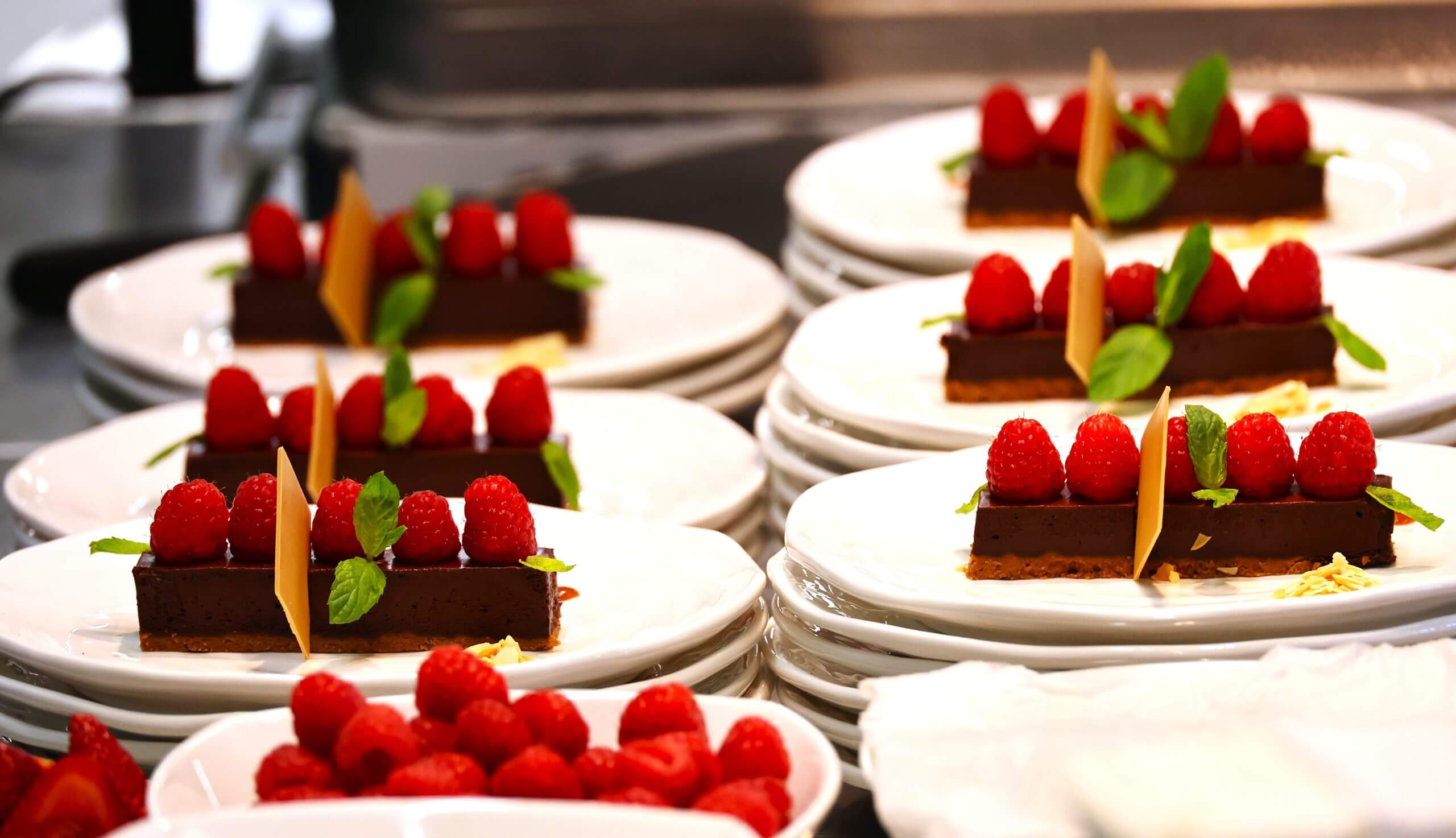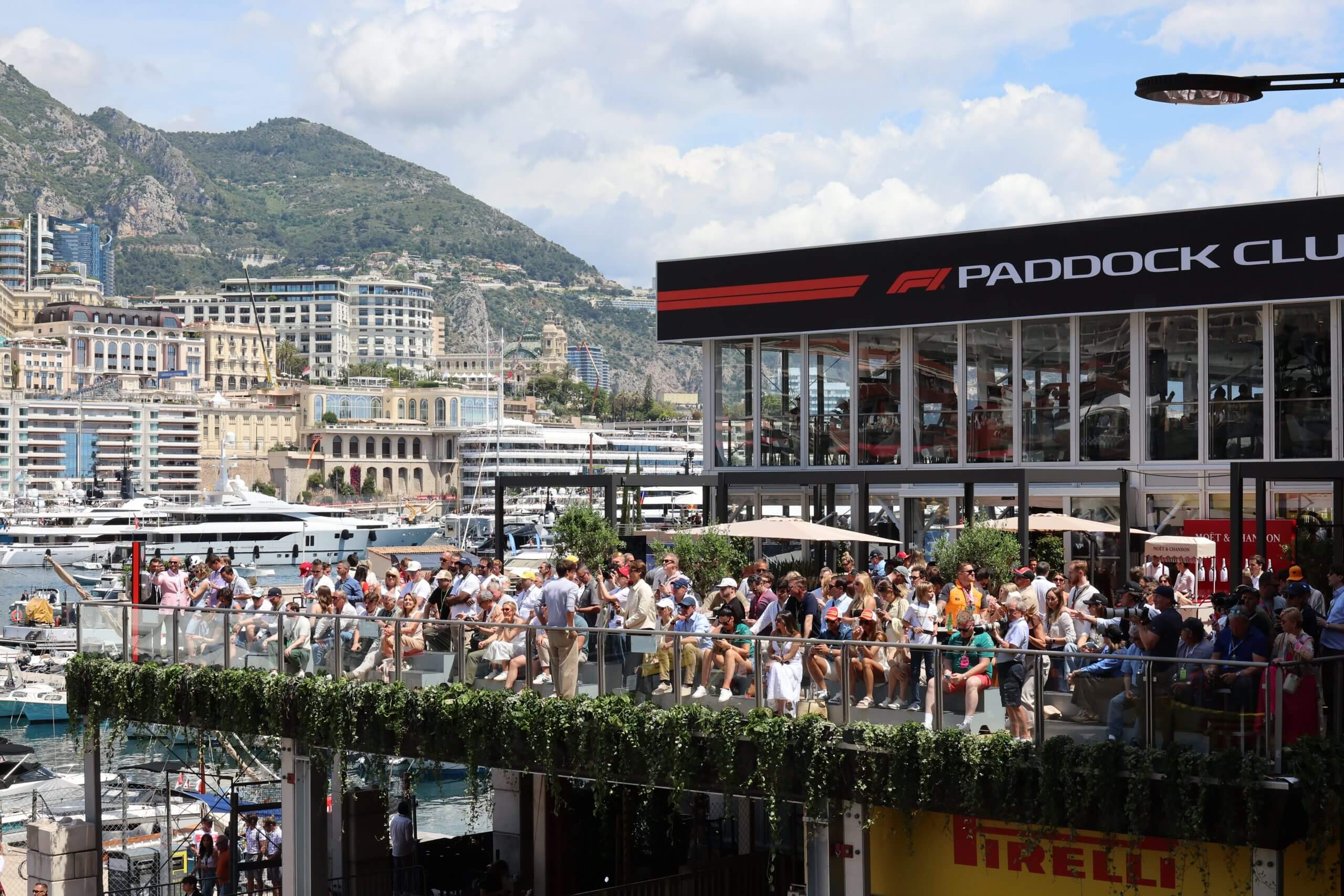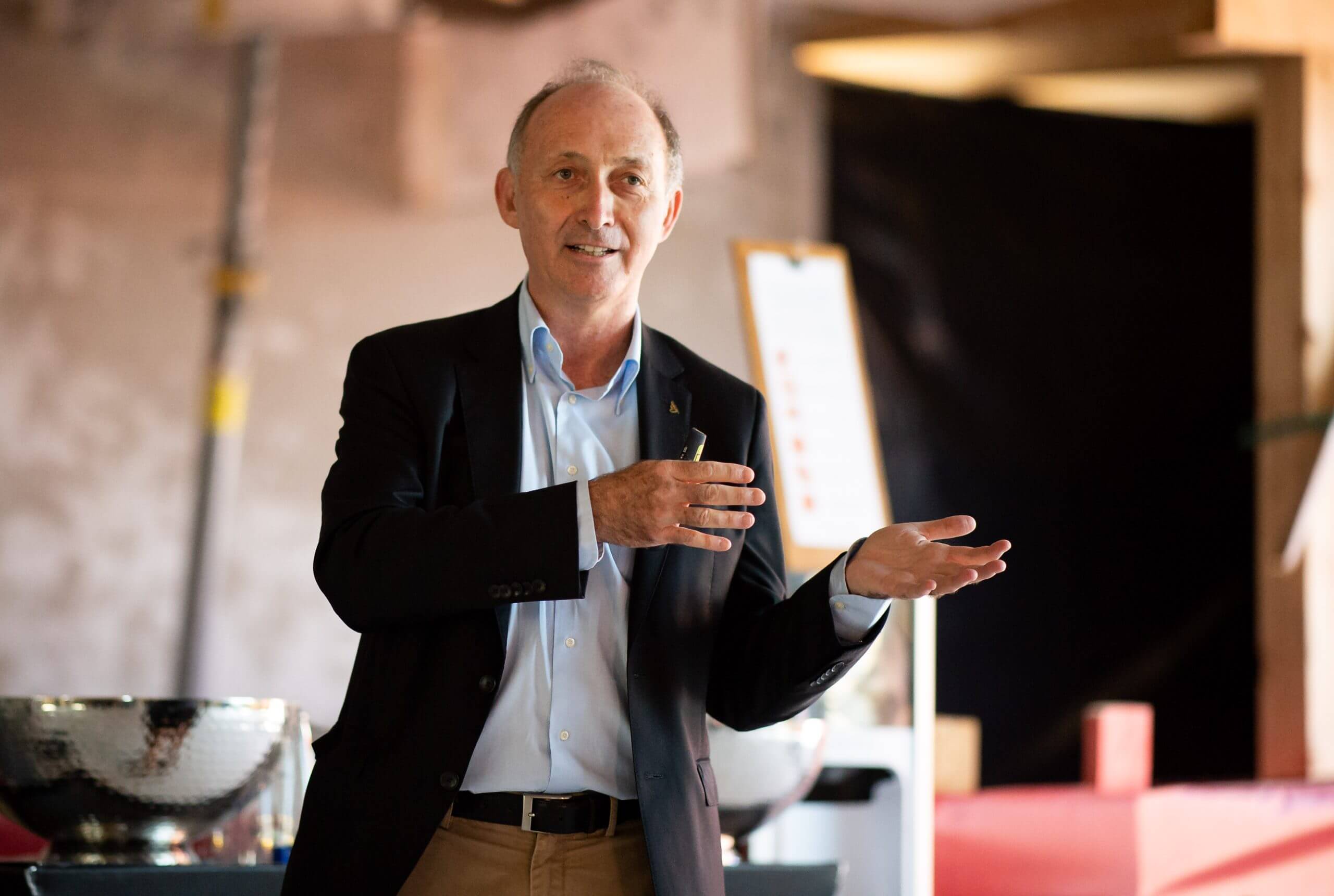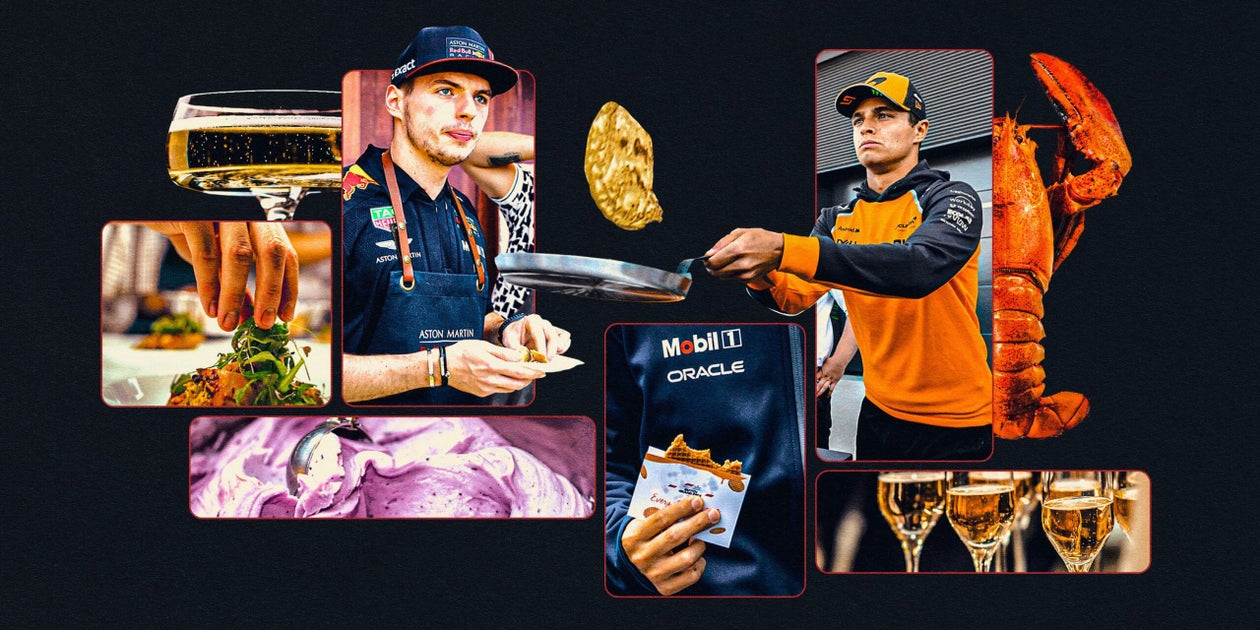This article is part of our Fast Lane Living series, examining the inner workings (practical and luxurious) of Formula One’s traveling circus.
Kitchens as big as four football pitches. Thousands of bottles of champagne and up to 100,000 meals in a weekend. As many as 3,000 lobsters per day.
Formula One has always cultivated a reputation as a glamorous and exclusive sport, one where the highest rollers chase experiences they cannot find elsewhere. That goes well beyond what happens on the racetrack. For both F1 and the teams, hosting thousands of VIP guests and each race means a focus on entertaining celebrities, schmoozing sponsors — and, of course, providing food and drink.
In F1’s quest to expand globally and attract new audiences, these dining experiences have helped transform each grand prix into a luxury lifestyle event. A weekend pass to F1’s Paddock Club costs between $5,000 and $13,000 per person, with more prestigious races charging higher prices and even more limited areas costing even more. The pass includes gourmet meals, open bars and pit lane access as part of the experience.
And this entire operation, across the F1 calendar, is largely the vision of one man.
Overseeing the large-scale endeavor is Attila Dogudan, the founder of DO & CO. He never expected to become so heavily involved in F1. Dogudan told The Athletic he was a “baby of restaurants,” growing up with a Turkish father and Austrian mother in Vienna. Both gave him an appreciation not just for food, but for blending and embracing different cultures.
That appreciation now drives a staggering F1 operation. DO & CO has what Dogudan described as a “big gourmet kitchen” that travels all over the world, following the sport from track to track. “When I say they are temporary kitchens, people would not understand,” he said. “It’s an incredible temporary kitchen. The biggest we had in Las Vegas was 250,000 square feet — for one kitchen!”
Each kitchen is divided into areas using panels (similar to an F1 team garage) for the different food groups, such as meat, fish or desserts, where dishes are prepared. It is kept at 15 degrees Celsius to maintain high hygiene requirements, and all the large pieces of equipment are on wheels so that if anything malfunctions, it can quickly be removed and replaced. This is a trick that Dogudan learned in the airline industry. And just like the F1 teams with their motorhomes, the “packdown” process is completed with military precision. In this case, before the race has even finished, ahead of getting ready to travel to the next event.
After the food is prepared in the large kitchen, often stationed not too far from the F1 paddock, the dishes are then finished at smaller food stations inside the Paddock Club itself. Having the dish finally cooked directly in front of guests is part of the experience.

Food available at the 2025 Saudi Arabian GP (F1)
This sprawling enterprise began with a single desperate phone call.
Dogudan’s involvement in F1 started just 10 days before the 1992 Hungarian Grand Prix, when Bernie Ecclestone – then F1’s commercial supremo, who controlled the sport’s business operations — had a problem. The local food supplier he’d planned to use to host 2,000 VIPs at the race, held on the outskirts of Budapest, had let him down. F1’s ringmaster had to find a replacement at the last minute.
Given Budapest’s proximity to Vienna (150 miles by road), Ecclestone asked Niki Lauda, the three-time world champion and Austrian great, who had remained a firm part of the paddock since retiring from F1, if he knew anyone who could help.
Lauda did. He’d met Dogudan while out clubbing a few years prior. At 3 a.m., they’d agreed — verbally at least — on a trial for Dogudan’s company to do the catering for Lauda’s airline. Lauda told Dogudan that so long as more than 95 percent of the feedback from passengers was positive, he could keep the contract. Dogudan, who had started with a delicatessen shop in Vienna in 1981 and launched his catering business in 1983, agreed. He wanted free airline tickets so he could travel more. It sparked a friendship between Dogudan and Lauda, who died in 2019, that spanned decades.
Like Dogudan, Lauda was a stickler for high standards, right down to the color of the Viennese schnitzel served on his planes. “It had to be golden brown – not brown, not light, not dark, golden brown,” Dogudan said. “(Lauda) called me after every flight and said, ‘The schnitzel is not golden brown.’ I looked at the color and said, ‘OK, it’s a little bit darker…’ ‘No, no, no, did we agree on golden brown? Yes or no?’ He became my best friend.”
Years later, it led Dogudan to get the call from Ecclestone ahead of the 1992 Budapest race.
“How many times is F1 going to ask you in your life?” Dogudan said. “I had no clue what I had to do, but I said yes on one condition: ‘If I do well, you have to give me a second race.’” Ecclestone said yes.
Dogudan’s company rallied. He used the diplomatic allowances given to F1 to get high-quality ingredients into Hungary, where restrictions were still in place just three years after the Iron Curtain had fallen. The local supermarkets, he said, only had “red peppers, green peppers, chicken, and a little pork.”
The final offering to the VIPs at the race delighted Ecclestone, who made good on his promise and gave Dogudan a second race in Germany. In the years that followed, DO & CO picked up deals to cater for F1’s high-end hospitality at more and more races, as Ecclestone and his managers worked to standardized their VIP offerings at every race to avoid any drops in quality.
Thirty-three years later, DO & CO looks after the hospitality in the Paddock Club at 22 of the 24 races each year. “There are not so many now who have a heritage of 33 years working here,” Dogudan said. “We went through all eras.” Even in his mid-60s, Dogudan is still a regular fixture on race weekends, sprightly touring the Paddock Club to ensure everything is running smoothly. He knows the chefs and hosting staff by name.
According to the company’s financial results for 2024-25, international event catering – which also includes other major sporting events such as the Champions League and the UEFA Euros soccer events – generated over €305 million in revenue. The company also supplies more than 60 airlines, and has its own restaurants and hotels. But to Dogudan, F1 has something special in global sport.
“Paddock Club and F1 is the benchmark in sports hospitality,” Dogudan said. “Everyone is watching what we are doing. So, we have to add on more innovation, quicker, better, and get your heart. Believe it or not, money is not the first driver. To win in our job means to make people happier than anywhere else. It’s very simple.”
That happiness means every single detail within the Paddock Club is given careful, considered attention. DO & CO does not just supply the food; it looks after all operations, including the decorations, music, furniture and staff. One of the DO & CO F1 chefs has cooked at the vast majority of grands prix for the past 25 years. According to Dogudan, around 400 staff members will work in the Paddock Club at an average race, but the number can increase to as high as 3,000 for the largest events.
At the biggest race on the calendar in terms of hospitality, Abu Dhabi, the Paddock Club will host as many as 10,000 guests. Monaco is the smallest at 1,100, with the Paddock Club’s average attendance sitting at 3,500 when taking in all events in the 2025 season

The Paddock Club at the Monaco GP (via F1)
Dogudan estimated over 35,000 meals will be consumed in the Paddock Club on a typical race weekend, a rate of around three to four dishes per person per day. For a race such as Las Vegas, one of the most lavish and hospitality-heavy on the calendar, that figure rises to around 100,000 meals due to the uptick in guest numbers.
Just like the F1 teams ship cars and spare parts to each race, DO & CO keeps sets of required equipment for its kitchens and hospitality areas in different regions (one for Europe, one for the Americas, etc.) to ensure consistency across all the races. For that reason, the same members of staff, many of whom are taken from DO & CO’s restaurants, are also used at each race. Dogudan compared it to seeing an act like the Rolling Stones: the stage and crew are the same everywhere they perform, given the lack of time to prepare for such a big event. It means those who enjoy hospitality in Las Vegas can get a similar offering in Japan or Abu Dhabi.
The Paddock Club menu is carefully crafted, aiming to give “some local touch, and combine it with international cuisines,” according to Dogudan. The basic menu changes every single day of a race weekend, typically featuring six or seven different dishes for guests to try. However, there are also bespoke cuisine stations serving specialties such as Austrian pastries or Italian gelato, depending on the race location.
Sample Menu
StartersMainsDessert
Mediterranean seafood salad
Fillet of beef with vegetable involtini
Medley of iced chocolate bar and baked strawberry filo
Artichoke and celeriac salad
Grilled Atlantic tuna and octopus
Al bronzo mezzi rigatoni with braised oxtail
While many ingredients are sourced locally, DO & CO will also ship supplies internationally to ensure authenticity. Dogudan said that staff cook as many as 3,000 lobsters per day for guests at a grand prix.
“This is not the cheapest ticket in the world, so people expect (luxury),” Dogudan said. “The key is that you overdeliver and make people happy, so they come back and they talk about you.”

Attila Dogudan’s company has been behind F1’s VIP dining for decades (Daniel Kopatsch / Getty Images)
Making that happen requires a mindset similar to those unleashed at an F1 team. What is good enough today won’t be tomorrow. Crafting menus and tinkering with meals is an intensive process. “You need to come with innovations people haven’t seen before,” Dogudan said. “It’s quite tricky.”
Dogudan recalled Ecclestone, whose tenure as F1’s boss ended in 2017, once saying to him: “Fine, but what is next? Make it quicker, make it better!” There was always a need to raise standards and ensure that those paying big money for VIP treatments at grand prix events were left satisfied.
“It’s all about milliseconds, it’s all about perfection, F1,” Dogudan said. “It’s the same in hospitality. We have to create an environment you really cannot find anywhere else.”
Now in his mid-60s, Dogudan still attends the majority of grands prix on the calendar, along with his son, Attila Jr., who is DO & CO’s chief commercial officer. He estimates that he spends 250 nights a year in hotels. They are still very close to two of Lauda’s sons, Mathias and Lukas, as the families grew up together.
F1 has grown a great deal in the 33 years that Dogudan has been part of the paddock. “If you invest in quality, then you get an incredible return, like in everything,” he said. “You come in and you see the logo, you know this is top notch … This is a concert where all of the musicians have to play together to have the best song and the best music.”
To Dogudan, F1 feels like “a Hollywood movie on the go,” where every single detail matters. “It’s taste, smell, it’s look, it’s light, it’s music — it’s racing, obviously, it’s all about racing! — and all that you have around makes the experience.”
The Fast Lane Living series is part of a partnership with Citi Cards.
The Athletic maintains full editorial independence. Partners have no control over or input into the reporting or editing process and do not review stories before publication.
(Top photos: Darren Heath / Getty, Marc Sutton / Getty, Mark Thompson / Getty, Kym Illman / Getty; Illustration: Kelsea Petersen / The Athletic)

